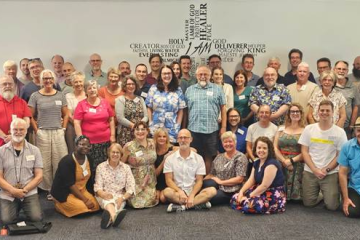4 Feb – Lifting up – 1 Kings 8: 41-43, Mark 1:29-39
There are lots of things mums like for Mother’s Day. Flowers, cups of tea, breakfast in bed, small smudgy handprints on cards, sons willing to do Bible readings! But more than anything we love knowing our children are doing well – so it’s a Mother’s Day treat for Linda – but it’s really a treat for all of us to have Cara here today to share what she got up to earlier this year….
(Cara shares story of time in Nepal.)
Thank you, Cara! Thank you so much for speaking to us, for sharing that experience and for sharing what you’ve learned about…. So helpful in the context of us committing to genuine welcome and to being open to others/learning from others!
This week I was speaking to Jan Abrahamffy, CBC’s longest attending member, and she assured me this church has always welcomed all people, and she told me about a devout Catholic friend, Duncan, (years ago when this was not so common) who would come to church here – especially to hear the choir. One day they were sharing a meal and had a robust discussion about whether Peter – the first pope according to Duncan – had been single. Jan pulled out her Bible and read Mark 1:30. “How could Peter be single if he had a mother-in-law,” she said! “Well,” said Duncan, “that bit must have been written by a Baptist!”
I do love this little story about Jesus healing Peter’s mother-in-law – not just because it sums up in a few words the compassionate nature of Jesus or because it tells us disciples were real people (just like us) – but because the word used here, when Jesus comes to this woman and takes her by the hand and lifts her up – that word ‘egeiro’ – reverberates throughout the rest of Mark’s gospel.
It’s found in Mark, chapter 2, verses 11 and 12, where Jesus says to a man who is paralysed, “Egeiro, rise up, stand up, take your mat and go to your home.” It is found in chapter five, verse 41, where Jesus says to Jairus’ daughter, declared dead, “Little girl, egeiro!” And she is restored to life. It is found in Mark 9:27, where, after healing a boy from convulsions, said to be possessed by a spirit, Jesus takes him by the hand and egeiro, lifts him up. It is found in Mark 11:50, where Jesus calls a man who is blind and, egeiro, he leaps up and comes to him.
Whenever egeiro is used in Mark, New Testament scholar Sarah Henrich writes, “The word suggests that new strength is imparted to those laid low by illness, unclean spirits, or even death, so that they may again rise up to take their place in the world.”
And the same word is used in Mark 16, verse 6, when the angel at the tomb says to Mary Magdalene, Mary the mother of James, and Salome, “Do not be alarmed; you are looking for Jesus of Nazareth, who was crucified. He has been egeiro. He has been raised; he is not here. Look, there is the place they laid him.”
Perhaps reverberation is not the word I’m looking for. This is a word that crescendos in Mark’s gospel; that crescendos in the resurrection! The lifting up, the raising up, the restoring to life and wholeness and fullness is found in all its life and wholeness and fullness in the resurrection of Jesus!
And egeiro continues to crescendo throughout history and throughout the world through the ministry of those who follow Jesus.
In dramatic ways, like the dramatic events of the past week for this church – disaffiliated from the Association because we want people to be able to bring their whole selves to worship – to God – in this place, and in small, domestic, every-day ways like Jesus taking this woman by the hand and raising her up.
It is egeiro when people come here to do yoga with Monica on Monday nights. It’s downward dog and warrior pose and salute to the sun, but it is also egeiro – lifting people up! It is egeiro on Tuesday mornings when mums and carers come with preschoolers to decompress, to support one another, to have fun. It’s egeiro when Kerstin and a group of people with disabilities and carers and others cook a meal and eat it together on a Wednesday. Its egeiro when people support one another at Crafty Fingers. And it is egeiro when people find community and connection and grow vegetables for refugees at the Community Garden.
And its egeiro when we care for colleagues or help out friends and neighbours or visit people in nursing homes or donate our lids for kids or get out and regenerate bushland. Its egeiro when we pray for one another and for our world. Its egeiro when pastors write a lovely letter to another church to encourage them. Its egeiro when young people get excited about making a difference in the world. Its egeiro when we give generously to aid and development.
All of these are ways in which we, like Jesus, because of Jesus, through Jesus give “new strength to those laid low by illness, [evil in our world], or even death, so [others and we ourselves can] rise up to take [our] place in the world.”
We sang earlier that the Son of God is here to stay embracing those who walk the way – the way of egeiro, the way of healing, the way of justice, the way of love in our world. Let’s sing this prayer that we might join the way of Jesus.


